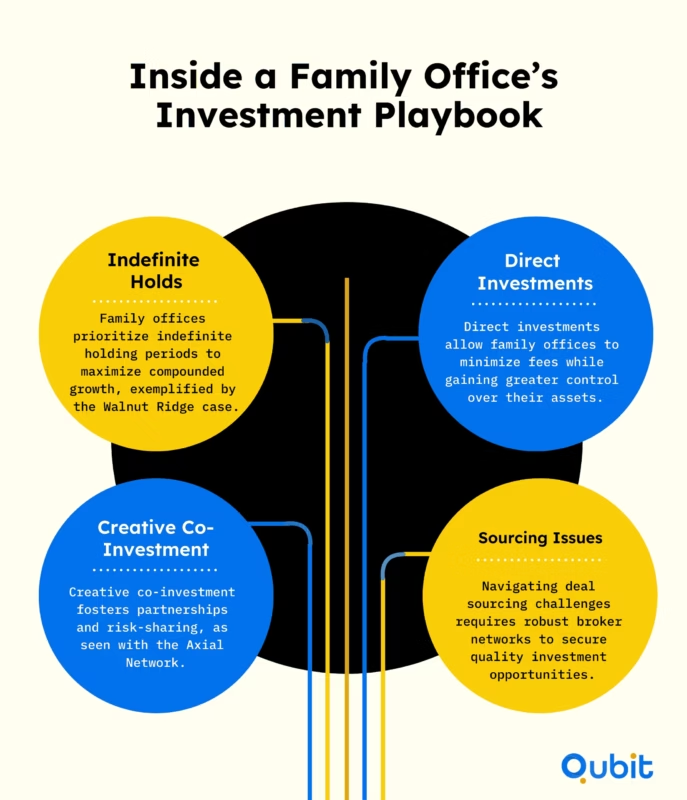Investors come in many forms, but two prominent categories—family offices and institutional investors—stand out for their distinct approaches to funding and wealth management. A family office, often established by affluent families, focuses on preserving generational wealth while offering tailored investment strategies. On the other hand, institutional investors, such as pension funds and endowments, operate with structured frameworks and larger-scale objectives.
Understanding these differences is crucial for entrepreneurs and businesses seeking funding. Your examination of funding distinctions is enhanced by insights from the types of investors in startups, which provides a broader overview of the various investor categories available. This article explores the nuances between family offices and institutional investors, helping you identify the right fit for your financial goals.
What Sets Family Offices Apart in Investment Strategies
Family offices have carved out a unique niche in the investment world, offering a distinct approach that sets them apart from institutional asset management. Their strategies emphasize long-term horizons, direct investments, and innovative structures, making them a compelling alternative to traditional private equity models.

Indefinite Holding Periods for Compounded Growth
Unlike institutional asset managers, family offices often hold investments indefinitely, allowing them to benefit from compounded growth over decades. This patient capital approach not only aligns with multi-generational wealth goals but also enhances tax efficiency. For example, Walnut Ridge Strategic Management Company, which oversees the Kanfer family’s wealth, exemplifies how long-term direct investing can yield sustainable returns.
This strategy contrasts sharply with the fixed exit cycles typical of private equity funds, where investments are often sold within 5–7 years to meet performance benchmarks. Family offices, by maintaining ownership for extended periods, can focus on value creation rather than short-term gains.
Direct Investment Strategies: Bypassing Traditional Fees
According to a 2021 survey by Citi Private Capital Group, nearly half of family offices allocate more than 25% of their portfolios to direct private investments. Family offices are increasingly shifting toward direct investments, bypassing the management fees associated with private equity firms. This trend reflects their fee aversion and desire for greater control over their assets.
Direct investments also enable family offices to build in-house expertise, with 39% of smaller offices (under $500 million AUM) now hiring dedicated investment staff. This move toward autonomy enhances their ability to identify and manage opportunities in sectors like technology, where 51% of family offices make direct investments compared to a 22% institutional average.
Creative Co-Investment Structures
To mitigate concentration risk and improve deal flow, family offices often design innovative co-investment structures. These partnerships allow them to share risks while accessing larger opportunities. For example, the Axial Network facilitates connections between family offices and business brokers, enhancing their ability to source attractive deals.
Co-investments also foster collaboration with other investors, enabling family offices to diversify their portfolios without compromising control. This approach is particularly effective in the lower middle market, where family offices differ significantly from institutional buyers. An Axial article highlights how these strategies are tailored to the unique needs of family offices.
Challenges in Deal Flow
Despite their advantages, family offices face challenges in maintaining consistent deal flow. Strong relationships with brokers and bankers are essential for sourcing opportunities, especially in competitive markets. Platforms like the Axial Network play a crucial role in connecting family offices with potential investments, ensuring they remain active participants in the private equity space.
Comparing Family Offices to Institutional Asset Management
Institutional asset managers operate within structured frameworks, often driven by exit strategies and performance metrics. Family offices, on the other hand, prioritize flexibility and long-term value creation. Their governance structures are tailored to multi-generational wealth management, allowing them to adapt to evolving family dynamics and investment goals.
For example, Akoya Capital Partners demonstrates the diverse management styles among family offices, emphasizing the importance of customized governance. This adaptability contrasts with the rigid mandates of institutional investors, such as CalSTRS, which must adhere to stringent ESG criteria and fixed timelines.
Expert Insights from Purdue’s Daniels Business School
The family offices are redefining investment strategies, and Purdue’s Daniels Business School offers a wealth of expertise to illuminate this evolving landscape. Through Daniels Insights, the institution provides thought leadership on critical aspects such as tailored investment criteria and the challenges family offices face compared to traditional funds.
The Importance of Tailored Investment Criteria
Family offices operate with unique priorities, often emphasizing personalized approaches to investment evaluation. Daniels Insights underscores the significance of robust due diligence processes, which are essential for aligning investments with the specific goals and values of these offices. Unlike traditional funds, family offices frequently prioritize long-term growth and legacy preservation over short-term gains.
This tailored approach demands a deep understanding of governance structures and risk management. The narrative is further detailed by examining the family office investment criteria, which outlines the specific measures used during the funding evaluation process. These criteria often include factors such as alignment with family values, diversification strategies, and the ability to adapt to emerging market trends.
Innovative Approaches and Emerging Challenges
Purdue’s Daniels Insights also highlights the innovative strategies family offices are adopting to stay ahead in competitive markets. For instance, many are exploring direct investments in startups, which offer higher potential returns but come with increased risks. This shift requires a balance between innovation and caution, as family offices must navigate uncharted territories while safeguarding their capital.
Another pillar exploring specialized aspects of family office investments can be found in family offices investing in startups. This resource delves into how family offices are unlocking exclusive capital for startups, fostering innovation while addressing challenges such as scalability and market volatility.
Broader Perspectives on Market Trends
Emerging market trends are reshaping the investment landscape, and family offices are uniquely positioned to capitalize on these opportunities. Daniels Insights emphasizes the importance of staying informed about global economic shifts, technological advancements, and demographic changes. These factors not only influence investment decisions but also shape the criteria family offices use to evaluate potential ventures.
For readers seeking a deeper dive into these topics, Daniels Insights offers subscription options and detailed resources that provide comprehensive analyses of investor evaluation practices. By subscribing, you gain access to exclusive content that equips you with the tools to understand and adapt to the dynamic world of family office investments.
Qubit Capital’s Expertise
At Qubit Capital, we understand the complexities of family office investments and offer tailored solutions to help you navigate this intricate domain. Whether you’re a startup seeking funding or a family office exploring new opportunities, our expertise ensures your investment strategies align with your goals.
Conclusion
Family offices and institutional investors bring distinct approaches to funding, each with its own strengths. Family offices often prioritize patient, long-term capital and active involvement, fostering deeper relationships with the businesses they support. In contrast, institutional investors focus on scalability and structured processes, offering access to larger pools of capital.
Understanding these differences can help entrepreneurs identify the funding source that aligns best with their vision. By embracing the innovative strategies discussed, businesses can unlock opportunities for sustainable growth while benefiting from the unique advantages of each investor type.
If you're looking to secure the right investors, we at Qubit Capital can help. Our Investor Discovery and Mapping service connects you with capital opportunities tailored to your needs.
Key Takeaways
Family offices offer patient, long-term capital by investing directly in startups and ventures without the constraints of short-term returns, making them ideal partners for sustained growth.
Their flexible investment strategies and avoidance of traditional fund management fees provide both cost efficiency and adaptability in deal structuring.
With distinct governance models, family offices are equipped to manage multi-generational wealth, align investments with legacy goals, and reduce potential internal conflicts
In contrast, institutional investors typically operate through structured funds with predetermined timelines, focusing on defined exit strategies and quarterly performance metrics.
For startups, understanding the differences between family offices and institutional investors is crucial when exploring funding options — especially when seeking alignment with long-term vision, control preferences, and strategic support.
Frequently asked Questions
What are the disadvantages of a family office?
Family offices may encounter obstacles such as high operational expenses, intricate governance frameworks, and generational disagreements. These factors can hinder decision-making and reduce overall efficiency.


 Back
Back



